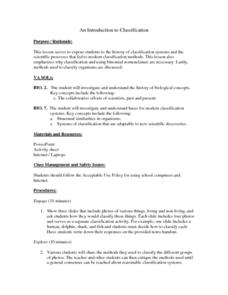EngageNY
Scientific Notation
Young mathematicians learn how scientific notation is meant to save time. Part 10, out of a series of 15, asks scholars to recognize the correct use of scientific notation and finish by adding and subtracting numbers using...
NASA
The Discovery of Jupiter Radio Waves
Lead your class on a journey to the planet Jupiter and provide them with fun facts in the process. Learners explore radio waves emitted by Jupiter to further understand how this data helps our daily lives. They conclude by discussing...
Curated OER
States Of Matter
Delv into the states of Matter. Students engage in the scientific inquiry process to uncover the exciting world of Matter. They watch a series of videos, and conduct experiments in order to collect and analyze data on the various state...
Curated OER
Cooking Up the Scientific Method
First graders identify the different steps of the scientific method. In this life science lesson, 1st graders apply this method when conducting a series of hands-on activities. They collect data and write observations in their journals.
Curated OER
The Scientific Method Using Mystery Powders
Learners use the scientific method to determine physical and chemical properties of unknown substances. In this scientific method lesson plan, students discuss chemical and physical properties of substances as a class after a...
Curated OER
Accidental Discoveries
High schoolers view and discuss several video segments and then work in groups to identify several scientific discoveries that were made by accident. They summarize their findings and present them to the class.
Curated OER
Tide Pool Discovery
First graders visit the Discovery Pool, where they use their senses to investigate the different tide pool species. They touch different species. Students describe how each one feels, and what they look like in words. They draw the...
Curated OER
Pond Ecology
A lab activity is a great way to incite thoughtful questioning and scientific processes. Pupils will collect organisms with a Petri dish, make observations, sketch the organism, ask questions, then attempt to identify the specimen...
Curated OER
Galileo: His Times & Beliefs
Learners study Galileo and his scientific discoveries. They complete a series of experiments/model constructions, using 17th century equipment and procedures, to "recreate," demonstrate and explore the various discoveries of Galileo.
Curated OER
Habitat Basics
First graders get out and explore two different habitats to examine how each one meets the needs of the plants and animals that dwell there. They discuss what they've learned about animal habitats as they explore the outdoor environment....
Curated OER
What is Science?
Students explore physical science by conducting a plant experiment. In this scientific method lesson plan, students discuss questions scientists ask in order to properly explore certain subjects. Students utilize two plants and place one...
Curated OER
Beach Combing: Evidence of Life
Young scholars comb the beach and gather remnants of unfamiliar life forms to make speculations about the origins of their discoveries. In this environments awareness instructional activity, students work in groups to search for evidence...
Curated OER
Crickets Guided Discovery
Sixth graders investigate insect anatomy by analyzing a live cricket. In this insect science lesson, 6th graders discuss their knowledge of insects and describe their characteristics from memory. Students observe live...
Curated OER
Scientific Data: It's Not as Pretty as It Looks!
The difference between accuracy and precision is fundamental for high school science learners. Using test kits for nitrate concentration in water, they compare readings with each other. They consider the accuracy, precision, and bias of...
Curated OER
Erosion Lab
Eighth graders explore variables that influence the rate of erosion due to the 4 major agents. They work as a group and practice conducting experiments according to the scientific method. Students comprehend that communicating ideas...
Curated OER
An Introduction to Classification
Sixth graders explore, analyze and study the history of classification systems and the scientific processes that influenced modern classification methods. They evaluate why classification and binomial nomenclature are necessary to the...
Curated OER
The Solar System: Why do we Explore?
Third graders act as scientists. In this property discovery lesson, 3rd graders explore the substance "Oobleck" (cornstarch, water, food coloring). They work in groups to investigate the substance and make observations as a scientist...
Baylor College
Body Strength
Your young learners will discover how muscular strength and endurance can increase with this truly hands-on activity! Beginning by writing an acrostic for the word strength, class members then engage in tracking their ability to squeeze...
Chicago Botanic Garden
Ecological Mismatches
Modeling is a powerful teaching tool. The final installment in a six-part series has pupils complete an activity to model a food web and discover the interconnected relationships in an ecosystem. They then read about changes in migratory...
Curated OER
Science is a Wonderland
Students use the scientific method to study Animalia and Plantae Kingdoms. In this science inquiry instructional activity, students watch a PowerPoint about science process skills. Students complete the National Geographic bottled...
Curated OER
Soar Into Spring With Kites!
The kite has an amazing history! It has been used for thousands of years, has led to many scientific disoveries, and has made some people very famous. Just ask Ben Franklin! This terrific lesson offers many cross-curricular activities...
LABScI
The Rutherford Atomic Model: Hidden Obstacles
Historically, scientists had to be creative to study subatomic structure. Scholars step into their minds to recreate the procedure Rutherford used to create his atomic model. Learners identify the creative efforts of early scientists...
Curated OER
Animal Adaptations
Fifth graders discover the adaptation of species through analyzing pictures. In this scientific discovery lesson, 5th graders discuss the concept of adaptation in order for survival. Students view many images of extinct...
Howard Hughes Medical Institute
Gorongosa: Making Observations Activity
Do you have young scientists wanting to make new discoveries rather than just completing the same experiments? Young scientists use their observational skills to identify animals and patterns in animal behavior. Through tracking...























